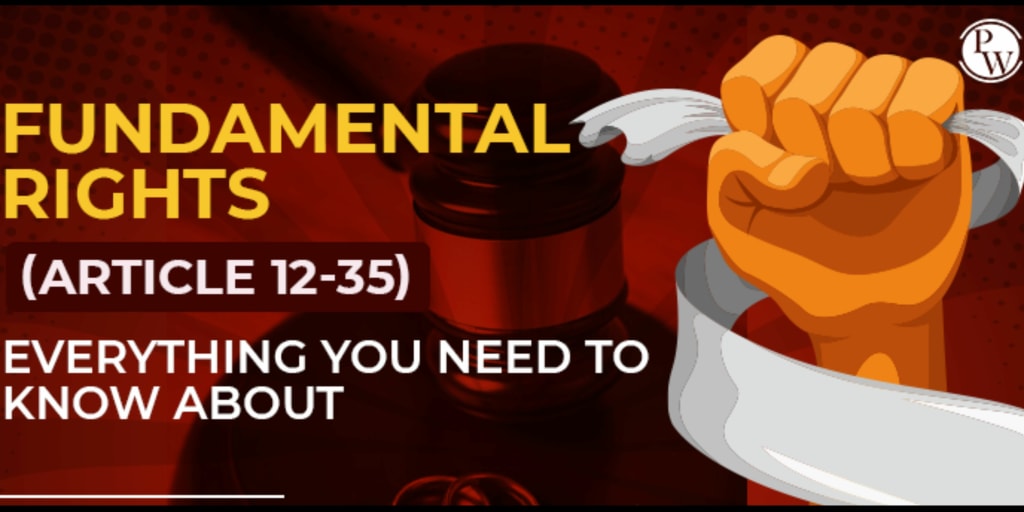Fundamental Rights Article 12-35 Everything You Need to Know About
Fundamental Rights

Fundamental rights is the basic, political, and civil rights conferred upon India's citizens to protect them from government encroachment.
As stated in Part III of the Indian constitution, fundamental rights are inviolable and ensure citizens' safety within India's territory without discrimination based on caste, religion, sex, gender, etc.
If you are preparing for SSC, Bank PO, MPPSC, UPPSC, etc., then the fundamental rights topic is one of the essential segments for these competitive examinations.
In this blog, we will discuss the core principle of the fundamental rights addressed in the Indian Constitution.
What Are Fundamental Rights?
Fundamental rights are the legal rights of Indian citizens, which are protected and guaranteed by the constitution of India. These rights ensure one’s freedom and liberty, zero discrimination based on caste, religion, sex, individual educational rights, etc., within the territory of India.
The fundamental rights are soo important because these rights are specially protected and enforced by the judiciary. No one can violets your fundamental rights. No government body can act in a way that breaches these fundamental rights. Supreme court act as a protector of fundamental rights.
Can also check: Ncert solutions for class 7 Maths
How Many Fundamental Rights Are In Indian Constitution?
There are six fundamental rights in the Indian constitution. Here we have listed them below according to the constitutional article.
Right to Equality(Article14-18)
Right to equality, ensures the equal protection of the law of every citizen, prohibit the discrimination on the ground of sex, religion, race, caste, and place of birth, provides equal opportunity in public work. It also abolishes untouchability and title.
Equality Before Law(Article 14)
Article 14 states equality before the law, states must ensure equal protection of the law of every citizen within the territory of India. Equality before the law means no one is greater than the law, and the law is equal for every citizen.
Prohibition of Discrimination(Article 15)
Article 15 states that discrimination should not be based on caste, race, religion, and birthplace in the public workplace.
Equality of Opportunity in Public Employment(Article 16)
Article 16 ensures equal employment opportunities for all citizens of India.
Abolition of Untouchability(Article 17)
Article 17 states the abolition of untouchability. Any form of practising untouchability is forbidden.
Abolition of Titles(Article 18)
Article 18 prohibits accepting any titles except academic or military titles.
Right to Freedom(Article 19-22)
The Right to freedom guarantees the freedom of the Indian citizen within the territory of India. It is one of the fundamental rights stated in the constitution that ensures citizens’ freedom regarding speech, expression, etc.
Articles 19 to 22 discuss the right to freedom. Let’s take up these articles one by one.
Freedom of Speech & Expression is the fundamental right of every citizen of India. The state should guarantee the freedom of speech and expression.
Freedom of Assembly ensures the peaceful assembly of the citizen of India within the territory of India.
Freedom of Association guarantees the formation of trade and union within the territory of India.
Freedom of Movement gives you the right to move freely within the territory of India.
Freedom of Residence allows the citizens to reside in any part of the country.
Freedom of Profession enables you to work whatever you want to do.
Protection in Respect of Conviction for Offenses(Article 20)
Article 20 deals with the security regarding conviction for offences. It provides three types of defence against the states, which are
- Retrospective Criminal Legislation
- Double Jeopardy
- Protection against self-incrimination
Right to Life(Article 21)
Article 21 is the most important fundamental right in the constitution because what will you do with these fundamental rights without life. No one shall be deprived of his life and liberty, Right to life states. The Supreme court quoted the right to life as the right to a dignified life.
Right to Education(Article 21A)
Article 21A was inserted by the 86th constitutional amendment act 2002. It guarantees free elementary education for children between the ages of six and fourteen.
Protection against arrest and detention in certain cases(Article 22)
Article 22 ensures the procedural safeguards of a citizen against arrest and detention in certain circumstances. It applies to both citizens and non-citizens of India. The reason behind framing this fundamental right to protect an individual from arbitrary arrest and detention.
Right Against Exploitation(Article 23-24)
Articles 23 and 24 discuss the prohibition of exploitation, trafficking of human beings and forced child labour. Enshrined in the constitution of India Right against exploitation guarantees any type of exploitation of labor and prohibits child labour.
Prohibition of Trafficking of Human Beings And Forced Labor(Article 23)
Article 23 states that trafficking of human begins and any form of forced labour is an offensive crime because there are many marginal communities in our country which are forced into labour work without any payment.
Prohibition of Child Labour(Article 24)
Prohibition of child labour(Article 24) states that children below 14 years of age are prohibited from working in a hazardous factory where life’s risk factor is high.
Right to Freedom of Religion(Article 25-28)
We live in a secular country, and everyone has the right to practice the religion they belong to. Every citizen of India has the right to choose his religion according to their faith. The state can not interfere with you in the matter of religion.
Freedom to Practice Religion(Article 25)
Article 25 guarantees the freedom of conscience and free profession, practice and propagation of religion. No one can forbid you from practising religious affairs.
Freedom to Manage Religious Affairs(Article 26)
Article 26 provides you with the right to manage religious and charitable intent.
Release of Payment of Taxes for any particular Religion( Article 27)
According to article 27, No taxes would levy on the religious matter.
Privilege to Attend Any Religious Worship in Certain Institution(Article 28)
Article 28 states that no religious instruction or practise should be given in the state-run educational institution.
Cultural & Educational Rights(Article 29-30)
India has a rich cultural heritage, and many minority populations exist in the country's different corners. Articles 29 and 30 talks about the protection of the interest of minorities and the right of minorities to establish and administer educational institutions.
Protection of Interest of Minorities(Article 29)
Article 29 guarantees the protection of interests of Minorities. Every individual residing in the country has a distinct culture and the right to protect their culture and heritage.
Right of Minorities to Establish And Administer Educational Institutions(Article 30)
Article 30 allows minorities to set up and govern their educational institution. It is also known as the Charter of Education right.
Right to Constitutional Remedies(Article 32-35)
Article 32 states remedies for enforcement of rights conferred by this part.
Article 33 gives the power of parliament to modify the rights granted by this part. It limits some fundamental freedoms of military personnel.
Article 34 states martial law in any area.
Article 35 legislation to give effect to the provision of this part.
Alright, we have discussed every fundamental right that is very important to the exam perspective. This blog has touched every nerve to clear your doubts regarding this topic. Below we have taken up some important frequently asked questions that will polish your general queries.
Can also check: JEE Mains
Frequently Asked Questions(FAQs)
1. What are fundamental rights?
Fundamental rights are the basic rights provided to every citizen, protected and guaranteed by institutions of India. These rights ensure one’s freedom and liberty, zero discrimination based on caste, religion, sex, individual educational rights, etc., within the territory of India.
2. From which country the modal of fundamental rights have taken?
The constitution of the USA.
3. What are the six fundamental rights in India?
The six fundamental rights listed in the Indian constitution are
- Right to Equality.
- Right to Freedom.
- Right Against Exploitation.
- Right to Freedom of Religion.
- Cultural And Educational Right.
- Right to Constitutional Remedies.
4. Which Fundamental Right is the “ Heart and Soul of the Constitution”?
Once Dr. B.R. Ambedkar referred to Article 32 as the “Heart and Soul of the Constitution.”
5. Who was the head of the Drafting Committee?
Dr. B.R. Ambedkar was the head of the Drafting Committee.
About the Creator
Vartika Sharma
I am Vartika, an experienced educator at Infinity Learn. In the role of a teacher, I find immense fulfillment in not only imparting knowledge but also in instilling a passion for learning that extends beyond the confines of textbooks.






Comments
There are no comments for this story
Be the first to respond and start the conversation.